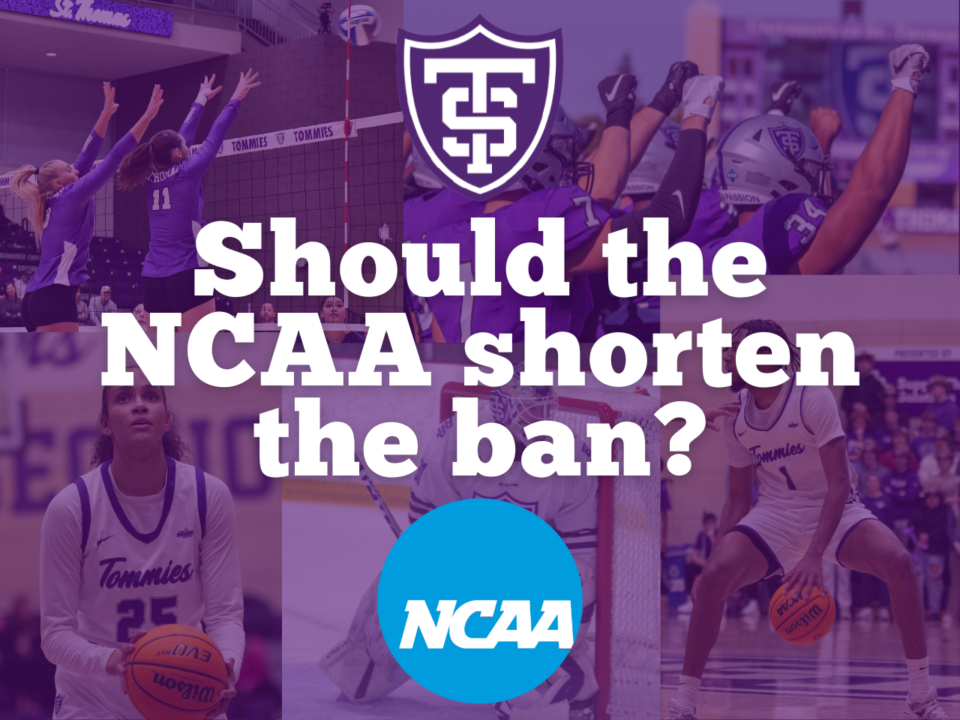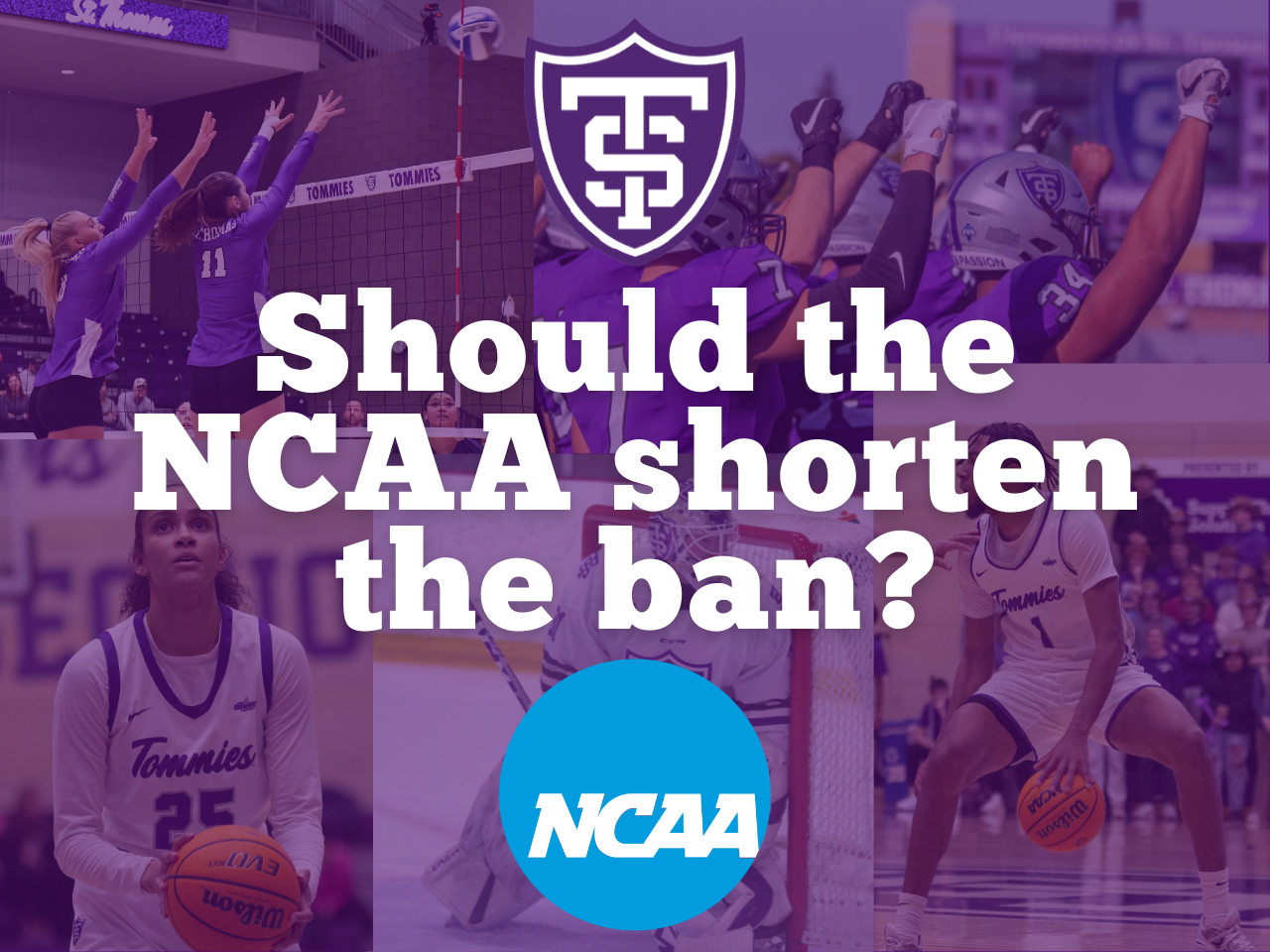
St. Thomas has seen quite a bit of progress in the athletic realm ever since jumping from NCAA Division III to Division I in 2021.
The football team won the Pioneer League Championship in 2022 with a 10-1 record and finished second place behind Drake in 2023 at 8-3. They’ve also managed to keep their home winning streak alive, with 31 straight wins at O’Shaughnessy Stadium. The Tommies have kept the streak since 2016, making it the longest in college football.
The Tommies have also made strides on the basketball court. The men’s team went 20-13 this season, beating North Dakota State in the quarterfinals of the Summit League Tournament before losing to eventual champion South Dakota State. They also managed to keep pace with nationally ranked Marquette, losing a tight 84-79 contest against the Golden Eagles.
The women’s basketball team, meanwhile, went 15-16, improving from 13-17 last year and managing to keep pace with a top-heavy Summit League. The Tommies also played against Iowa State and Wisconsin at home, marking the first time the team has hosted any Power Six opponents.
Both teams would have to win the Summit League Tournament to go to the NCAA Tournament, but with the steady improvements both teams have made, I don’t think that’s out of the question for the near future.
On the ice, St. Thomas’ men’s hockey team improved to 15 wins this season from 11 the year before, notching a win against nationally-ranked St. Cloud State and bringing the Minnesota Golden Gophers to the brink, narrowly losing in a 6-5 overtime thriller at Xcel Energy Center.
The women’s hockey team had its struggles, finishing with just 10 wins this season. However, the team still had its highlights as well, including a 5-1 win against nationally-ranked St. Cloud State.
For a program that has been D-I for just three years, a lot of headway has been made. Beyond the improvements the teams have made themselves, St. Thomas is also building new venues for those teams, including the Lee and Penny Anderson Arena for basketball and hockey and the Highland Bridge baseball and softball stadiums.
However, there’s a catch: the Tommies can’t compete in postseason play outside of their conference until the 2026-27 school year. This means no NCAA or National Invitation Tournament appearances for basketball; and no FCS Playoff appearances for football, which the Tommies would’ve been able to compete in after winning the Pioneer League Championship in 2022 had they not been banned.
The NCAA instituted a 5-year provisional period for St. Thomas while the teams adjust to D-I. This is longer than the standard 4-year period because the Tommies made a two-level jump from D-III to D-I, something that hadn’t been done since Buffalo and Dayton did it in 1993.
St. Thomas isn’t alone in its reclassification struggles. James Madison University saw its football team transition from FCS to FBS starting in 2022. After going 8-3, they appealed to the NCAA to have their ban shortened from two years to one but were denied. The Dukes then proceeded to go 11-2 in 2023 but were not allowed to compete for the Sun Belt Conference Championship or compete in a bowl game unless there weren’t enough eligible teams to compete.
However, with the achievements the Tommies have had since going D-I, I think it may be time to reconsider this ban.
D-I is a wide-ranging division, and St. Thomas has adjusted quite well to it, competing with some of the highest reaches in the division. They’ve done this while some athletes from the D-III era remain on team rosters, such as graduate forward Parker Bjorklund from the men’s basketball team, who averaged 13.2 points and 4.6 rebounds a game this past season.
The transition to D-I was a major change, and St. Thomas appears to have taken it quite seriously, both in terms of performance and planning. I think it’s time the NCAA takes the school’s sports seriously as well.
As I write this, I’m currently a sophomore at St. Thomas. By the time St. Thomas is eligible for tournament play, I will most likely have graduated without being able to see it, despite the program’s success.
St Thomas and James Madison show that transitions like this can be done smoother than the lengths of these bans seem to suggest. It might be time to revisit the reclassification policy to potentially make these bans shorter for programs looking to transition in the future. The achievements of both programs show that if done correctly, success at higher levels of play can come quickly.
I don’t know if it’s likely that the NCAA will change its mind before the ban is over. The Tommies would likely have to appeal, and given the results from James Madison, I’m not optimistic. However, I think they should at least reevaluate the ban. I think St. Thomas is ready for the next step in their transition to D-I, even if they’re a bit ahead of schedule.
Miles Schiffer can be contacted at schi9629@stthomas.edu.



